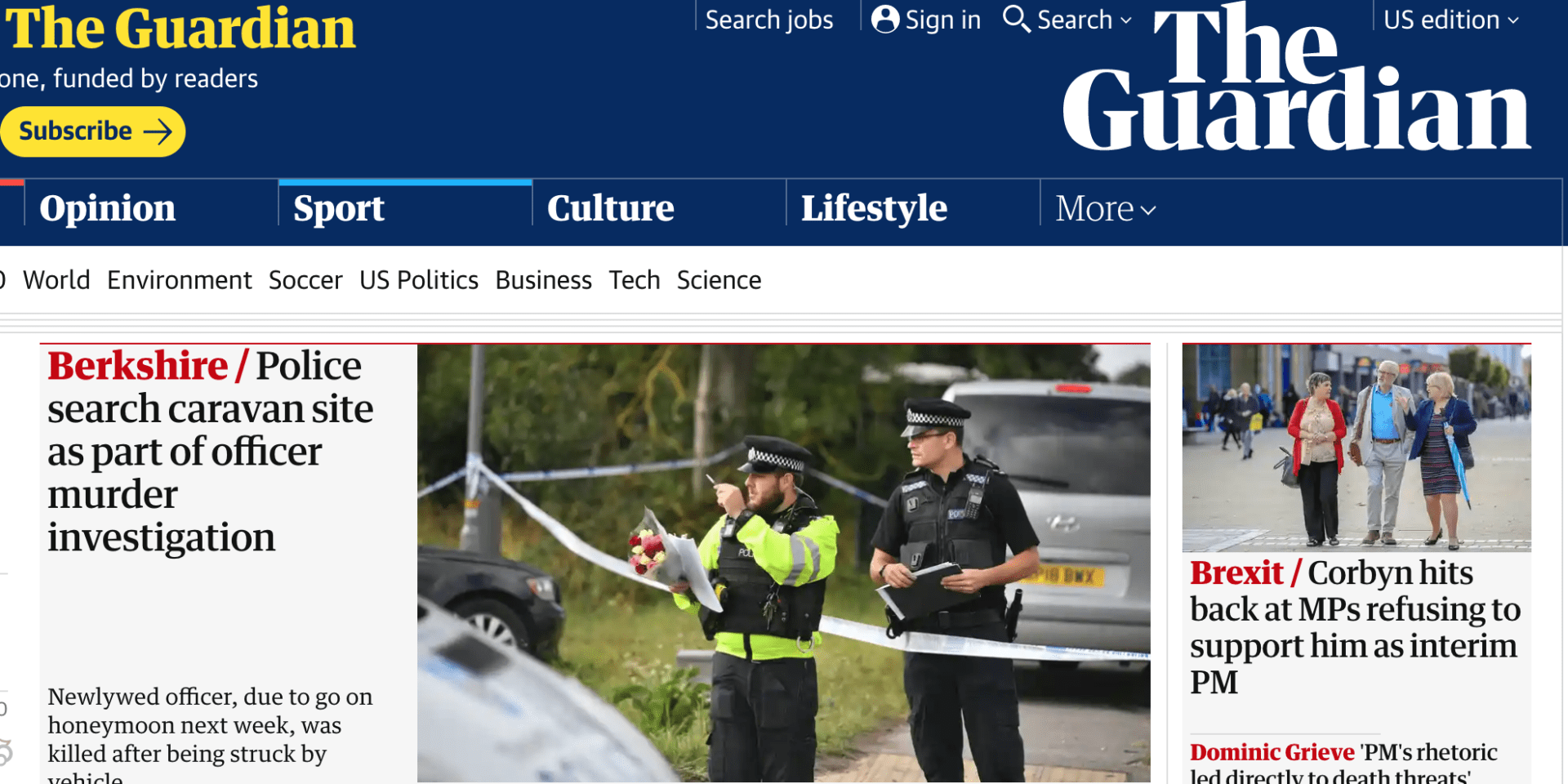
On August 15, BuzzFeed News reported that a leaked resignation letter from one of the Guardian’s UK-based employees accused the paper of being “an incredibly transphobic organization,” despite its “liberal” image. These allegations describe a culture of trans exclusion in both words and coverage choices at the Guardian, along with its sister site, the Observer.
BuzzFeed’s UK LGBT Editor, Patrick Strudwick, explained the holistic—and damning—appraisal from the unnamed employee, a trans woman who worked for the Guardian in the UK as follows:
Following the leak of the email to BuzzFeed News, the trans employee, who spoke on the condition of anonymity, said she felt complicit in the newspaper’s “transphobic” reporting by continuing to work there, and revealed the damaging effect the Guardian’s coverage of transgender people has had on her well-being. This included fear of using the women’s toilet at work.
Such editorial lines, she said, are a “blind spot” for the largely progressive publication, which last month published a long read criticising other news outlets for their stigmatizing coverage of refugees, another marginalised group.
In addition to the organization’s editorial and managerial shortcomings, the employee alleged her “colleagues [also] had made transphobic remarks to her,” suggesting it’s not just a matter of the higher-ups.
At the same time, and much like some assessments of staff at the New York Times, the former Guardian employee’s departure from the paper “marks a flashpoint,” one defined by a “deepening” divide within the paper and among readers. This inter-generational “wrangling,” she said, “helped push her toward the exit” and ongoing failures to catch up with society will ensure the Guardian “would lose more talent and alienate younger readers.”
A Liberal Voice with a Glaring “Blind Spot”
The Guardian’s recent LGBTQ-oriented coverage includes breadth and depth, with stories on the sad closure of an LGBTI radio station in Melbourne, Australia, a lovely roundup of Britain’s “10 most outstanding LGBTQ writers,” courtesy of Val McDermid and others.
But it’s the Guardian and Observer’s coverage of trans issues which has prompted cycles of controversy and backlash.
Back in February 2019, the Guardian reported the resignation of a board member at the Tavistock and Portman NHS Foundation Trust, which operates the innovative Gender Identity Development Service (GIDS), a provider of health services to the UK’s LGBTQ adolescents. Governor Marcus Evans resigned in opposition to Tavistock’s operation of GIDS programs, which he claimed were “fast-tracking” gender transitions for young people, mirroring reports in the Observer.
Only six months later, Mr. Evans was cited as an “expert” in a later Guardian article about the overly “politicized” work of pro-trans groups in the UK – without mentioning his earlier resignation or offering any context for his expertise.
In the same piece, the Guardian uncritically cites the case of “Dagny,” a woman who transitioned in her teens, then later de-transitioned. The story of “Dagny,” though, comes from a source demanding, at the very least, some further context: Feminist Current, which is self-described as a “radical feminist” outlet and has published many pieces highly critical of including trans and gender non-conforming people in the feminist movement. Recent pieces might also be credibly accused of leaning into transphobic tropes about “women’s safety” in public with respect to the infamous bathroom bills of the last half-decade.
(Per the online lingo, Feminist Current decries the “T.E.R.F.,” or “trans-exclusionary radical feminist,” label. The site does exclude those individuals and their perspectives, with or without the perceived “epithet” labeling applied.)
The Guardian failed to identify its sources as such, and received some backlash via reader letters published earlier this month. At the same time, another letter was included, taking the opposing view, but again featuring garbled prose and an unclear set of claims for scrutinizing the identities and health needs of trans youths.
BuzzFeed’s Strudwick cites another, similar example,
In June, the Guardian published another editorial about “identities in conflict”, characterising trans people and feminists as distinct oppositional groups — ignoring pro-trans feminists. It was later amended following internal opposition.
Strudwick also neatly summarized the blow-up over the July Observer piece citing Evans:
In July, a front-page story in the Observer, the Guardian’s sister title, ignited fury from some staff because of its accompanying tweet, “Young people not getting objective advice because of trans lobby pressure,” and the unchallenged views of a sole “expert” who opined that children were being fast-tracked into transition because mental health professionals were scared of being called transphobic.
With this public resignation and denunciation—combined with US-based Guardian staff “publicly [condemning] its UK coverage of trans stories,” the anonymous resignation letter author’s warnings of internal schism were apt. (Though this does not detract in any manner from US-based Guardian reporters, whose work this morning covering far-right militias’ rallies in Portland, Ore., cements them as one of few national or global outlets properly dedicated to a key story.)
Nonetheless, there seems to be a broader trend of transphobic coverage across the pond. The Times of London also is facing accusations of systematic transphobia and a discrimination suit as a result, suggesting UK-based outlets generally are a bit of a mess on this critical set of issues.
Then again, maybe those of us on this side of the Atlantic should avoid tossing stones in this particular glass house.
(Source: BuzzFeed News)
